25 sept 2019
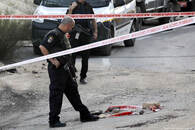
Israeli soldiers gather at the scene where a Palestinian was shot dead near a check point in the the West Bank city of Hebron on 3 September 2018
Images of Palestinians girls or women lying in the middle of the road with blood seeping from their heads have become “normal” since the autumn of 2015.
Women, children and men have all become victims to be added to the growing body of statistics that the global media never stops to consider when reporting on this most asymmetric of conflicts.
They are the victims of the field executions committed by the Israeli occupation forces against Palestinians — women, children and men — at the humiliating and frequently fatal military checkpoints imposed across the occupied West Bank and East Jerusalem.
The tragedy of these victims does not end with the hastily-fired gunshots; the wounded and dying are left to bleed while the soldiers sip their coffee and go about their regular activities, after “neutralising” the alleged threat.
Images and videos circulated on social media demonstrate that Israeli soldiers and police officers do little to try to arrest suspected criminals; they shoot first and, maybe, ask questions later.
It is obvious from the evidence that they are too keen to pull the trigger and shoot a target who could be as young as their own children or as old as their mothers.
It is even more of a tragedy that the victim is rarely named until hours or even days later, placing major psychological pressure on the community who have no real idea if a relative or friend has been shot and killed.
Last week, on 18 September to be precise, a Palestinian woman called Nayfa Ali Ka’abna, aged 50, was shot and killed by Israeli soldiers. tweet
She was named officially four days after she was basically executed at the Qalandiya checkpoint, north of Jerusalem. After she was shot, she was left on the side of the road in a growing pool of blood for some time.
To understand what happened to Nayfa, it is worth looking at the growing phenomenon of field executions over the past four years.
Hadeel Al-Hashlamoun was crossing through an Israeli military checkpoint in Hebron on 22 September, 2015, when she was shot. The Israeli narrative claimed that the 18 year old did not comply with the order to stop and therefore posed a danger to the soldiers.
The young woman was in her first year of university, and was known in the local neighbourhoods for her solidarity with Palestinian families affected by settler harassment. She had to cross the checkpoints repeatedly for this purpose.
On the day of the deadly attack, two soldiers ordered her to stop and then fired at least 10 bullets at her from their automatic rifles. Hadeel fell to the ground after being hit by the first bullet, but the soldiers continued to fire at her. Most of the bullets hit her chest and upper body.
The Israeli occupation army immediately claimed, as usual, that the young woman had tried to attack the soldiers with a knife, and that the heavily-armed soldiers acted “according to protocol” as their lives were in danger. Many pictures surfaced on social media proving the Israeli claim to be false.
The reality of this heinous murder was documented by a passer-by; the two soldiers opened fire on Hadeel from a distance of 4 metres and no knife was seen. The brutality of the attack was escalated by the fact that she was left on the ground for about half an hour after being shot.
Journalist Amira Hass reported the details of the crime in Haaretz on 3 November, 2015, based on documented facts which disprove the army’s narrative.
Hadeel Al-Hashlamoun’s family took the case to court, but the Israeli judicial system ensured that the army and its soldiers were acquitted, as usually happens. The family appealed, but the result was the same.
The case was closed in February 2019, with the soldiers acquitted of all charges. This was no surprise; the so-called Israeli “Defence” Forces’ story is normally accepted as the truth without question.
The world ignored the tragedy of Hadeel Al-Hashlamoun at the time, giving the occupation authorities a tacit green light to continue the field executions on the pretext that the victims “pose a danger to the lives of soldiers”.
Killing Palestinians in this way has become a recurring fact of life protected by carefully woven justifications. However, the idea of a fruit knife held by a schoolgirl, shining from afar, actually posing a threat to the lives of a group of armed soldiers wearing body armour just doesn’t ring true.
Moreover, firing numerous bullets at a girl, woman, man or boy and at a part of the body where death is almost certain to result suggests that Israeli soldiers have little or no regard for Palestinian lives.
The official Israeli version of field executions is simply not credible. It is now a fact, though, that any Palestinian going about their lawful business can expect to be shot at random if they are on foot at a military checkpoint. Make a wrong move or display any “unusual behaviour” — a very loosely-defined term — and they can face a lethal volley of bullets.
This poses an even bigger threat to those with hearing or visual impairments, or those who do not understand the gestures or orders yelled by soldiers and police officers, not least due to the different language and means of expression.
Israel’s military checkpoints may now be rooted deeply in Palestinian life, but they remain a threat to those with mental health issues or other communication difficulties. If someone has a seizure or fit at one of these checkpoints, they could pay for it with their life.
Given the number of these incidents, the Palestinians are convinced that the occupation authorities do not hesitate to justify any field execution committed by their security forces even before any investigation can take place — if it takes place at all.
The killers are not above planting a knife next to the victims lying on the ground to “prove” their dishonest narrative.
Furthermore, even if a schoolgirl is holding a knife with the intention of attacking the fully trained and armed soldiers, why are they incapable of disarming her? Shooting her when she is well beyond arms’ reach looks like an extremely disproportionate response.
As the list of “knife-wielding attackers” shot dead grows longer, how many of their intended victims were actually killed? None whatsoever.
What is certain in all of this, is that the Israeli occupation forces are able to kill Palestinians at will, and get away with it.
The uncomfortable truth absent from the propaganda pushed out by Israel and its supporters is that the killers of dozens of indigenous Palestinian men, women and children in field executions across the occupied West Bank and Jerusalem in recent years are actually members of an occupation army violating international law; they don’t deserve our sympathy.
It is their victims who live — and die — under military occupation and oppression and are deserving of whatever we can do to help them. tweet
Field executions are one of the “sovereign manifestations” that the Israeli occupation forces have monopolised at their many checkpoints intended to disrupt Palestinians in their daily lives. They impede freedom of movement, cause humiliation and provide opportunities for arrest and, as we have seen, murder.
Such serious violations led a number of anti-occupation Israelis to form a human rights group a few years ago to monitor what the security forces are doing at the checkpoints. It is called Machsom (Checkpoint) Watch, but the Israeli government is busy cracking down on groups like this one, claiming that they are “working against the state” and discrediting them.
Before we accept the Israeli excuses for the killing of Palestinians at the checkpoints, we must acknowledge the presence of occupation forces in the Palestinian territories; and that the deployment of heavily-armed troops to direct and disrupt everyday life poses a real and present threat to ordinary Palestinians of all ages, male and female alike.
No reasonable human being, let alone a member of a brutal occupation army and oppressive regime, can expect people who are deprived of their liberty, independence and control of their land and resources to pass around flowers to the soldiers who spend their days humiliating, torturing and killing them.
The Palestinians don’t need anyone to incite them to act against the occupation forces; Israel’s policies and practices in the occupied territories do that job perfectly well without any need for any input from anyone else.
The dozens of children and young people shot and killed by the occupation forces at checkpoints were eyewitnesses to the murder, arbitrary arrests, intimidation and humiliation of their families, friends and fellow citizens.
Ignoring the field executions that have taken place encourages the Israeli occupation soldiers to carry on shooting at will; we all appear to be immune to the sight of a Palestinian lying in a pool of blood for no apparent reason other than the ongoing Israeli propaganda about “incitement” and “knife attacks”.
Nayfeh Ka’abna was the latest in a growing line of victims like Hadeel Al-Hashlamoun whose blood was shed and allowed to flow into the gutter so callously by young men and women armed to the teeth with the latest weapons and ammunition.
These women were yet more victims of Israel and its ongoing occupation that the world does not care about.
Images of Palestinians girls or women lying in the middle of the road with blood seeping from their heads have become “normal” since the autumn of 2015.
Women, children and men have all become victims to be added to the growing body of statistics that the global media never stops to consider when reporting on this most asymmetric of conflicts.
They are the victims of the field executions committed by the Israeli occupation forces against Palestinians — women, children and men — at the humiliating and frequently fatal military checkpoints imposed across the occupied West Bank and East Jerusalem.
The tragedy of these victims does not end with the hastily-fired gunshots; the wounded and dying are left to bleed while the soldiers sip their coffee and go about their regular activities, after “neutralising” the alleged threat.
Images and videos circulated on social media demonstrate that Israeli soldiers and police officers do little to try to arrest suspected criminals; they shoot first and, maybe, ask questions later.
It is obvious from the evidence that they are too keen to pull the trigger and shoot a target who could be as young as their own children or as old as their mothers.
It is even more of a tragedy that the victim is rarely named until hours or even days later, placing major psychological pressure on the community who have no real idea if a relative or friend has been shot and killed.
Last week, on 18 September to be precise, a Palestinian woman called Nayfa Ali Ka’abna, aged 50, was shot and killed by Israeli soldiers. tweet
She was named officially four days after she was basically executed at the Qalandiya checkpoint, north of Jerusalem. After she was shot, she was left on the side of the road in a growing pool of blood for some time.
To understand what happened to Nayfa, it is worth looking at the growing phenomenon of field executions over the past four years.
Hadeel Al-Hashlamoun was crossing through an Israeli military checkpoint in Hebron on 22 September, 2015, when she was shot. The Israeli narrative claimed that the 18 year old did not comply with the order to stop and therefore posed a danger to the soldiers.
The young woman was in her first year of university, and was known in the local neighbourhoods for her solidarity with Palestinian families affected by settler harassment. She had to cross the checkpoints repeatedly for this purpose.
On the day of the deadly attack, two soldiers ordered her to stop and then fired at least 10 bullets at her from their automatic rifles. Hadeel fell to the ground after being hit by the first bullet, but the soldiers continued to fire at her. Most of the bullets hit her chest and upper body.
The Israeli occupation army immediately claimed, as usual, that the young woman had tried to attack the soldiers with a knife, and that the heavily-armed soldiers acted “according to protocol” as their lives were in danger. Many pictures surfaced on social media proving the Israeli claim to be false.
The reality of this heinous murder was documented by a passer-by; the two soldiers opened fire on Hadeel from a distance of 4 metres and no knife was seen. The brutality of the attack was escalated by the fact that she was left on the ground for about half an hour after being shot.
Journalist Amira Hass reported the details of the crime in Haaretz on 3 November, 2015, based on documented facts which disprove the army’s narrative.
Hadeel Al-Hashlamoun’s family took the case to court, but the Israeli judicial system ensured that the army and its soldiers were acquitted, as usually happens. The family appealed, but the result was the same.
The case was closed in February 2019, with the soldiers acquitted of all charges. This was no surprise; the so-called Israeli “Defence” Forces’ story is normally accepted as the truth without question.
The world ignored the tragedy of Hadeel Al-Hashlamoun at the time, giving the occupation authorities a tacit green light to continue the field executions on the pretext that the victims “pose a danger to the lives of soldiers”.
Killing Palestinians in this way has become a recurring fact of life protected by carefully woven justifications. However, the idea of a fruit knife held by a schoolgirl, shining from afar, actually posing a threat to the lives of a group of armed soldiers wearing body armour just doesn’t ring true.
Moreover, firing numerous bullets at a girl, woman, man or boy and at a part of the body where death is almost certain to result suggests that Israeli soldiers have little or no regard for Palestinian lives.
The official Israeli version of field executions is simply not credible. It is now a fact, though, that any Palestinian going about their lawful business can expect to be shot at random if they are on foot at a military checkpoint. Make a wrong move or display any “unusual behaviour” — a very loosely-defined term — and they can face a lethal volley of bullets.
This poses an even bigger threat to those with hearing or visual impairments, or those who do not understand the gestures or orders yelled by soldiers and police officers, not least due to the different language and means of expression.
Israel’s military checkpoints may now be rooted deeply in Palestinian life, but they remain a threat to those with mental health issues or other communication difficulties. If someone has a seizure or fit at one of these checkpoints, they could pay for it with their life.
Given the number of these incidents, the Palestinians are convinced that the occupation authorities do not hesitate to justify any field execution committed by their security forces even before any investigation can take place — if it takes place at all.
The killers are not above planting a knife next to the victims lying on the ground to “prove” their dishonest narrative.
Furthermore, even if a schoolgirl is holding a knife with the intention of attacking the fully trained and armed soldiers, why are they incapable of disarming her? Shooting her when she is well beyond arms’ reach looks like an extremely disproportionate response.
As the list of “knife-wielding attackers” shot dead grows longer, how many of their intended victims were actually killed? None whatsoever.
What is certain in all of this, is that the Israeli occupation forces are able to kill Palestinians at will, and get away with it.
The uncomfortable truth absent from the propaganda pushed out by Israel and its supporters is that the killers of dozens of indigenous Palestinian men, women and children in field executions across the occupied West Bank and Jerusalem in recent years are actually members of an occupation army violating international law; they don’t deserve our sympathy.
It is their victims who live — and die — under military occupation and oppression and are deserving of whatever we can do to help them. tweet
Field executions are one of the “sovereign manifestations” that the Israeli occupation forces have monopolised at their many checkpoints intended to disrupt Palestinians in their daily lives. They impede freedom of movement, cause humiliation and provide opportunities for arrest and, as we have seen, murder.
Such serious violations led a number of anti-occupation Israelis to form a human rights group a few years ago to monitor what the security forces are doing at the checkpoints. It is called Machsom (Checkpoint) Watch, but the Israeli government is busy cracking down on groups like this one, claiming that they are “working against the state” and discrediting them.
Before we accept the Israeli excuses for the killing of Palestinians at the checkpoints, we must acknowledge the presence of occupation forces in the Palestinian territories; and that the deployment of heavily-armed troops to direct and disrupt everyday life poses a real and present threat to ordinary Palestinians of all ages, male and female alike.
No reasonable human being, let alone a member of a brutal occupation army and oppressive regime, can expect people who are deprived of their liberty, independence and control of their land and resources to pass around flowers to the soldiers who spend their days humiliating, torturing and killing them.
The Palestinians don’t need anyone to incite them to act against the occupation forces; Israel’s policies and practices in the occupied territories do that job perfectly well without any need for any input from anyone else.
The dozens of children and young people shot and killed by the occupation forces at checkpoints were eyewitnesses to the murder, arbitrary arrests, intimidation and humiliation of their families, friends and fellow citizens.
Ignoring the field executions that have taken place encourages the Israeli occupation soldiers to carry on shooting at will; we all appear to be immune to the sight of a Palestinian lying in a pool of blood for no apparent reason other than the ongoing Israeli propaganda about “incitement” and “knife attacks”.
Nayfeh Ka’abna was the latest in a growing line of victims like Hadeel Al-Hashlamoun whose blood was shed and allowed to flow into the gutter so callously by young men and women armed to the teeth with the latest weapons and ammunition.
These women were yet more victims of Israel and its ongoing occupation that the world does not care about.
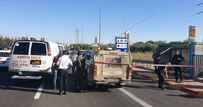
An Israeli settler was injured on Wednesday afternoon in an alleged stabbing attack west of Ramallah district in the occupied West Bank.
Yedioth Ahronoth reported that an Israeli settler in her twenties suffered minor injuries after she was stabbed by a Palestinian boy at Maccabim junction west of Ramallah.
Israeli occupation forces later rushed to the place and arrested the 14-year-old boy.
No further details were given on whether the Palestinian boy was shot before he was detained.
Woman hurt in suspected terror attack near Modi'in
22-year-old sustained light to moderate wounds in stabbing close to Maccabim Junction on Route 443; rescue personnel treat victim at the scene; suspected attacker, a 14-year-old Palestinain teen, arrested by security forces as he tried to flee the scene
A 22-year-old woman was lightly to moderately wounded Wednesday afternoon in a suspected terror attack near the cental city of Modi'in.
The woman sustained stab wounds to her upper body in the attack on Route 443, close to Maccabim Junction.
The suspected attacker, a 14-year-old Palestinian boy, was arrested by Border Police officers who were driving by at the time of the incident.
The teenager was apprehended while trying to escape.
Yedioth Ahronoth reported that an Israeli settler in her twenties suffered minor injuries after she was stabbed by a Palestinian boy at Maccabim junction west of Ramallah.
Israeli occupation forces later rushed to the place and arrested the 14-year-old boy.
No further details were given on whether the Palestinian boy was shot before he was detained.
Woman hurt in suspected terror attack near Modi'in
22-year-old sustained light to moderate wounds in stabbing close to Maccabim Junction on Route 443; rescue personnel treat victim at the scene; suspected attacker, a 14-year-old Palestinain teen, arrested by security forces as he tried to flee the scene
A 22-year-old woman was lightly to moderately wounded Wednesday afternoon in a suspected terror attack near the cental city of Modi'in.
The woman sustained stab wounds to her upper body in the attack on Route 443, close to Maccabim Junction.
The suspected attacker, a 14-year-old Palestinian boy, was arrested by Border Police officers who were driving by at the time of the incident.
The teenager was apprehended while trying to escape.
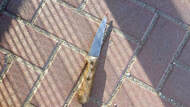
The knife used in the suspected attack
Magen David Adom parademics and other emergency personnel treated the woman at the scene of the incident.
United Hatzalah volunteer EMT Yosef Horowitz, who was one of the first responders at the scene said: "Together with other other EMS (emergency medical services) personnel, I treated a young woman who suffered a stab wound to her upper body.
"She was in light to moderate condition. We also treated another person who sustained light injuries in the incident."
Magen David Adom parademics and other emergency personnel treated the woman at the scene of the incident.
United Hatzalah volunteer EMT Yosef Horowitz, who was one of the first responders at the scene said: "Together with other other EMS (emergency medical services) personnel, I treated a young woman who suffered a stab wound to her upper body.
"She was in light to moderate condition. We also treated another person who sustained light injuries in the incident."
22 sept 2019
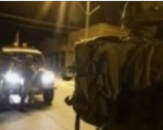
Israeli soldiers abducted, earlier Sunday, eight Palestinians from the West Bank governorates of Hebron, Nablus, and Jerusalem.
In Hebron governorate, in southern West Bank, the soldiers abducted six Palestinians from Beit Kahil and Beit Ula towns, west of Hebron city, after the soldiers invaded and searched their homes, in addition to searching many other homes in the governorate.
The soldiers abducted Mahmoud Salem Zhour, Zahran Mahmoud Zhour, Mohammad Taiseer Asafra, Moath Mahmoud Asafra, and Yousef Ahmad Asafra, from Beit Kahil town, in addition to Raed Abdul-Afo al-‘Emla from Beit Ula.
It is worth mentioning that the soldiers also installed roadblocks on roads leading to many towns in Hebron governorate, before stopping and searching many cars and interrogated the residents while inspecting their ID cards.
In addition, the army abducted Emad Nihad Qayyim, from Ras al-‘Ein area, after stopping him at Beit Forik military roadblock, east of Nablus, in northern West Bank, after the soldiers claimed he had a knife in his possession.
In occupied Jerusalem, the soldiers abducted Yasser Khatib, from his home in Hizma town, east of the city.
In Hebron governorate, in southern West Bank, the soldiers abducted six Palestinians from Beit Kahil and Beit Ula towns, west of Hebron city, after the soldiers invaded and searched their homes, in addition to searching many other homes in the governorate.
The soldiers abducted Mahmoud Salem Zhour, Zahran Mahmoud Zhour, Mohammad Taiseer Asafra, Moath Mahmoud Asafra, and Yousef Ahmad Asafra, from Beit Kahil town, in addition to Raed Abdul-Afo al-‘Emla from Beit Ula.
It is worth mentioning that the soldiers also installed roadblocks on roads leading to many towns in Hebron governorate, before stopping and searching many cars and interrogated the residents while inspecting their ID cards.
In addition, the army abducted Emad Nihad Qayyim, from Ras al-‘Ein area, after stopping him at Beit Forik military roadblock, east of Nablus, in northern West Bank, after the soldiers claimed he had a knife in his possession.
In occupied Jerusalem, the soldiers abducted Yasser Khatib, from his home in Hizma town, east of the city.
18 sept 2019
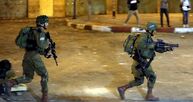
Violent confrontations flared up on Tuesday evening between Israeli occupation forces (IOF) and dozens of Palestinian youths in Azzun town east of Qalqilya City.
Local sources said that the Palestinian youths hurled stones and Molotov cocktails at the IOF soldiers and settler vehicles at the entrance to Azzun town.
The IOF later installed a checkpoint on the road between Azzun and Jayyus towns, stopped Palestinian vehicles, and interrogated the passengers.
Local sources said that the Palestinian youths hurled stones and Molotov cocktails at the IOF soldiers and settler vehicles at the entrance to Azzun town.
The IOF later installed a checkpoint on the road between Azzun and Jayyus towns, stopped Palestinian vehicles, and interrogated the passengers.
|
|
Nayfa Mohammad Ali Ka’ana, 50
The wounded Palestinian woman, who was shot by the soldiers, on Wednesday, September 18th, after an alleged stabbing attempt at Qalandia Terminal, north of occupied Jerusalem, has been officially identified, Son Sunday evening, as Nayfa Mohammad Ali Ka’ana, 50. The Palestinian Health Ministry in the West Bank has confirmed the identity of the slain woman and added that Ka’abna was from al-Mo’arrajat Bedouin community, near Taybeh Palestinian village, northeast of the central West Bank city of Ramallah. After she was shot, she was left bleeding for a long time, before an Israeli ambulance moved her to Hadassah Israeli Medical Center in Jerusalem, where she succumbed to her wounds. Israeli daily Haaretz has reported that the soldiers saw the woman and ordered her to stop, “but she did not heed to their commands, and pulled out a knife before the soldiers shot her. Following the incident, the soldiers closed the terminal and maced many Palestinians with pepper-spray while trying to remove them from the area. Israel did not release her name, and her identity was mistaken with another Palestinian woman, however, on Sunday evening, the Israeli “District Coordination Office” officially informed ist Palestinian counterpart in the West Bank of her identity. The woman’s corpse is still with the Israeli side. |
Updated: “Israeli Soldiers Kill A Palestinian Woman Near Qalandia Terminal”
Israeli sources have confirmed that the wounded Palestinian woman, who was shot by the soldiers after an alleged stabbing attempt, has died from her injuries.
The slain Palestinian woman was later identified as Ala’ Nafeth Wahdan, 25, from Qalandia refugee camp.
After she was shot, she was left bleeding for a long time, before an Israeli ambulance moved her to Hadassah Israeli Medical Center in Jerusalem, where she succumbed to her wounds.
Israeli daily Haaretz has reported that the soldiers saw the woman and ordered her to stop, “but she did not heed to their commands, and pulled out a knife before the soldiers shot her.
Following the incident, the soldiers closed the terminal and maced many Palestinians with pepper-spray while trying to remove them from the area.
Israeli Soldiers Kill A Palestinian Woman Near Qalandia Terminal
Updated From: Sep 18, 2019 @ 08:37
Israeli soldiers shot, on Wednesday morning, a Palestinian woman near Qalandia Terminal, north of occupied East Jerusalem, reportedly for carrying a knife with the intention of stabbing them.
Israeli media sources claimed the young woman attempted to stab the soldiers before they shot her. So far, the extent of her injuries remains unknown.
A video filmed by a Palestinian bystander shows soldiers several meters away from the woman before one of them shot her, then a soldier approached her and kicked an object away from her.
The soldiers then closed the area and ordered the Palestinian cars away.
Israeli sources have confirmed that nobody else was injured in the incident and added that an army probe is underway.
Following the incident, the soldiers closed the terminal, and maced many Palestinians with pepper-spray while trying to remove them from the area. video video
Israeli sources have confirmed that the wounded Palestinian woman, who was shot by the soldiers after an alleged stabbing attempt, has died from her injuries.
The slain Palestinian woman was later identified as Ala’ Nafeth Wahdan, 25, from Qalandia refugee camp.
After she was shot, she was left bleeding for a long time, before an Israeli ambulance moved her to Hadassah Israeli Medical Center in Jerusalem, where she succumbed to her wounds.
Israeli daily Haaretz has reported that the soldiers saw the woman and ordered her to stop, “but she did not heed to their commands, and pulled out a knife before the soldiers shot her.
Following the incident, the soldiers closed the terminal and maced many Palestinians with pepper-spray while trying to remove them from the area.
Israeli Soldiers Kill A Palestinian Woman Near Qalandia Terminal
Updated From: Sep 18, 2019 @ 08:37
Israeli soldiers shot, on Wednesday morning, a Palestinian woman near Qalandia Terminal, north of occupied East Jerusalem, reportedly for carrying a knife with the intention of stabbing them.
Israeli media sources claimed the young woman attempted to stab the soldiers before they shot her. So far, the extent of her injuries remains unknown.
A video filmed by a Palestinian bystander shows soldiers several meters away from the woman before one of them shot her, then a soldier approached her and kicked an object away from her.
The soldiers then closed the area and ordered the Palestinian cars away.
Israeli sources have confirmed that nobody else was injured in the incident and added that an army probe is underway.
Following the incident, the soldiers closed the terminal, and maced many Palestinians with pepper-spray while trying to remove them from the area. video video
17 sept 2019
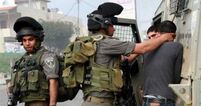
Israeli occupation forces (IOF) on Tuesday arrested two Palestinian youths near Ein Bubin area, west of the West Bank city of Ramallah, over alleged knife possession.
The Israeli website "0404" claimed that two Palestinians were arrested near Ein Bubin on suspicion of attempting a knife attack.
It added that the detainees were later transferred to an Israeli interrogation center.
Ein Bubin is a natural spring located in Deir Ibzi town west of Ramallah. Many Palestinian citizens own farmlands there but they are denied access to their property by the Israeli authorities.
The Palestinian site is constantly targeted by Israeli settler groups who aim to completely take over the area.
The Israeli website "0404" claimed that two Palestinians were arrested near Ein Bubin on suspicion of attempting a knife attack.
It added that the detainees were later transferred to an Israeli interrogation center.
Ein Bubin is a natural spring located in Deir Ibzi town west of Ramallah. Many Palestinian citizens own farmlands there but they are denied access to their property by the Israeli authorities.
The Palestinian site is constantly targeted by Israeli settler groups who aim to completely take over the area.
12 sept 2019
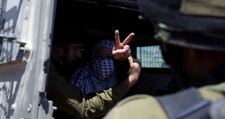
The Israeli occupation police on Thursday morning kidnaped a Palestinian young girl from her home in Issawiya district , east of Jerusalem, claiming she carried out a car-ramming attack.
According to 0404 website, a 20-year-old girl from Issawiya was arrested for carrying out a vehicular attack last night on a road near Atarot settlement in Jerusalem.
The Israeli police said last night that one border police officer and a settler were injured when a speeding car hit them, adding that they launched an investigation into the incident.
According to 0404 website, a 20-year-old girl from Issawiya was arrested for carrying out a vehicular attack last night on a road near Atarot settlement in Jerusalem.
The Israeli police said last night that one border police officer and a settler were injured when a speeding car hit them, adding that they launched an investigation into the incident.
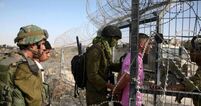
The Israeli occupation forces (IOF) on Wednesday evening kidnaped two Palestinian young men during their presence in a southern border area of the Gaza Strip.
A spokesperson for the IOF claimed the young men infiltrated through the wire fence using cutters and were also found in possession of knives.
Every once in a while, the IOF announces the arrest of Palestinian young men from Gaza at the pretext of infiltrating through the border fence.
A spokesperson for the IOF claimed the young men infiltrated through the wire fence using cutters and were also found in possession of knives.
Every once in a while, the IOF announces the arrest of Palestinian young men from Gaza at the pretext of infiltrating through the border fence.
7 sept 2019
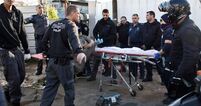
Two Israeli settlers on Saturday afternoon suffered different injuries in an alleged stabbing attack near the West Bank town of Azzun.
Haaretz newspaper reported that two settlers were stabbed on a road between Nablus and Qalqilya in the West Bank, and one of them sustained a serious injury.
Israeli media sources said that the Israeli forces arrested the young man who carried out the attack, but no further details were given about his identity.
Israeli occupation forces following the incident threw a cordon around Azzun town and blocked its entrances.
They installed several makeshift barriers in the surrounding areas, stopped Palestinian vehicles, and searched passengers.
Two Israeli Settlers Injured In Stabbing Attack Near Qalqilia
Israeli sources have reported that a 17-year-old Israeli settler was seriously injured, while his father, 60, suffered mild wounds, when a Palestinian stabbed them in Azzoun town, east of Qalqilia, in northern West Bank.
The sources stated that the two were about to enter a Palestinian dental clinic in Azzoun, when a Palestinian approached them and stabbed them.
According to Israel Ynet News, the uncle of the wounded teen who was accompanying him and his father, claimed that the Palestinian “asked if they were Jewish,” to which he reportedly replied “No, we are Arabs,” before the Palestinian stabbed the father and his son.
The Palestinian Dentist then rushed to help the wounded Israeli teen and his father and provided them with need urgent care.
Israeli soldiers arrived at the scene and moved the wounded Israelis to Eliyahu military roadblock near the illegal Alfei Menashe colony, where they received treatment by Israeli medics and were moved to Meir Medical Center in Kfar Saba.
Ynet added that the Palestinian who assaulted the settler is only 15 years of age, and that he surrendered himself to the local Palestinian security services.
It is worth mentioning that the soldiers abducted the Palestinian dentist and took him to an interrogation facility run by the Shabak, despite statements from the wounded Israeli father who told the army that the dentist defended them and tried to remove the assailant.
Palestinians in Azzoun said the dentist, who studied in Russia, has many Israeli Russian-speaking clients who frequent his clinic.
Haaretz newspaper reported that two settlers were stabbed on a road between Nablus and Qalqilya in the West Bank, and one of them sustained a serious injury.
Israeli media sources said that the Israeli forces arrested the young man who carried out the attack, but no further details were given about his identity.
Israeli occupation forces following the incident threw a cordon around Azzun town and blocked its entrances.
They installed several makeshift barriers in the surrounding areas, stopped Palestinian vehicles, and searched passengers.
Two Israeli Settlers Injured In Stabbing Attack Near Qalqilia
Israeli sources have reported that a 17-year-old Israeli settler was seriously injured, while his father, 60, suffered mild wounds, when a Palestinian stabbed them in Azzoun town, east of Qalqilia, in northern West Bank.
The sources stated that the two were about to enter a Palestinian dental clinic in Azzoun, when a Palestinian approached them and stabbed them.
According to Israel Ynet News, the uncle of the wounded teen who was accompanying him and his father, claimed that the Palestinian “asked if they were Jewish,” to which he reportedly replied “No, we are Arabs,” before the Palestinian stabbed the father and his son.
The Palestinian Dentist then rushed to help the wounded Israeli teen and his father and provided them with need urgent care.
Israeli soldiers arrived at the scene and moved the wounded Israelis to Eliyahu military roadblock near the illegal Alfei Menashe colony, where they received treatment by Israeli medics and were moved to Meir Medical Center in Kfar Saba.
Ynet added that the Palestinian who assaulted the settler is only 15 years of age, and that he surrendered himself to the local Palestinian security services.
It is worth mentioning that the soldiers abducted the Palestinian dentist and took him to an interrogation facility run by the Shabak, despite statements from the wounded Israeli father who told the army that the dentist defended them and tried to remove the assailant.
Palestinians in Azzoun said the dentist, who studied in Russia, has many Israeli Russian-speaking clients who frequent his clinic.
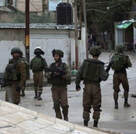
Israeli soldiers abducted, Friday, three Palestinians, including two children, in Jerusalem and Ramallah, in the occupied West Bank.
The Palestinian Prisoners’ Society (PPS) has reported that the soldiers abducted Sari Essam Barghouthi, after invading his home and ransacking it, in Kobar village, northwest of Ramallah in central West Bank.
The PPS added that the abducted young man is the nephew of detained Fateh leader and a member of its Executive Committee Marwan Barghouti.
In addition, the soldiers abducted Ahmad Khaled Atiyya, 16, while leaving the local mosque in the al-‘Isawiya town, northeast of occupied East Jerusalem.
The town has been subject to daily Israeli military invasions, violent home searches, abductions and ongoing protests.
Furthermore, the soldiers abducted Jaber Hamad Jaber, 16, near the Ibrahimi Mosque in the southern West Bank city of Hebron, allegedly for “carrying a knife.”
The soldiers also closed the iron gate of the main road near Beit Awwa town, west of Hebron, and prevented the Palestinians from crossing.
The closed road leads to Beit Awwa, Deir Samit, al-Majd, Sikka, Beit ar-Roush and Deir al-‘Asal villages and towns, southwest of Hebron.
The Palestinian Prisoners’ Society (PPS) has reported that the soldiers abducted Sari Essam Barghouthi, after invading his home and ransacking it, in Kobar village, northwest of Ramallah in central West Bank.
The PPS added that the abducted young man is the nephew of detained Fateh leader and a member of its Executive Committee Marwan Barghouti.
In addition, the soldiers abducted Ahmad Khaled Atiyya, 16, while leaving the local mosque in the al-‘Isawiya town, northeast of occupied East Jerusalem.
The town has been subject to daily Israeli military invasions, violent home searches, abductions and ongoing protests.
Furthermore, the soldiers abducted Jaber Hamad Jaber, 16, near the Ibrahimi Mosque in the southern West Bank city of Hebron, allegedly for “carrying a knife.”
The soldiers also closed the iron gate of the main road near Beit Awwa town, west of Hebron, and prevented the Palestinians from crossing.
The closed road leads to Beit Awwa, Deir Samit, al-Majd, Sikka, Beit ar-Roush and Deir al-‘Asal villages and towns, southwest of Hebron.
